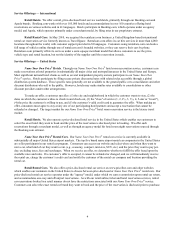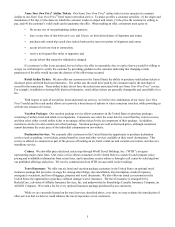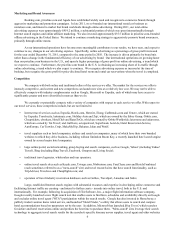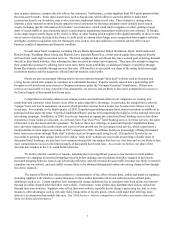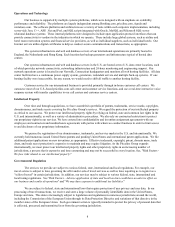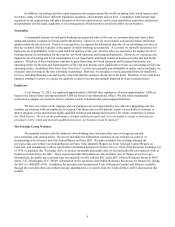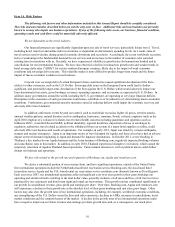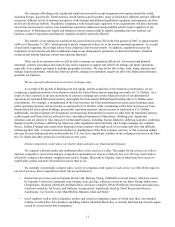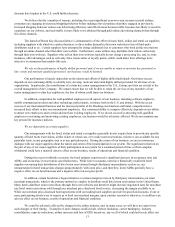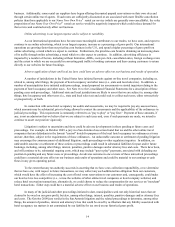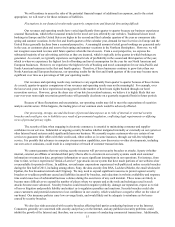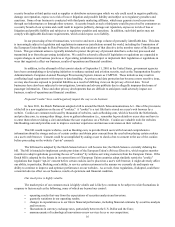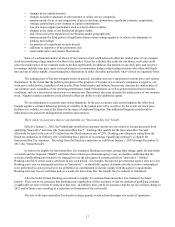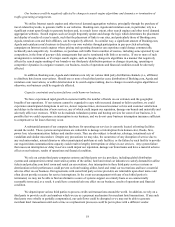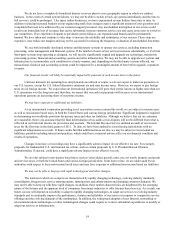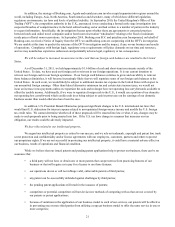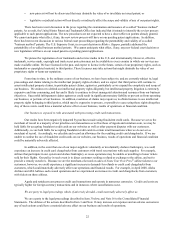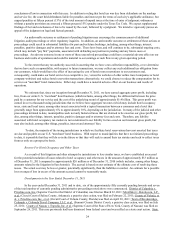Priceline 2011 Annual Report Download - page 15
Download and view the complete annual report
Please find page 15 of the 2011 Priceline annual report below. You can navigate through the pages in the report by either clicking on the pages listed below, or by using the keyword search tool below to find specific information within the annual report.14
business. Additionally, some rental car suppliers have begun offering discounted prepaid reservations on their own sites and
through certain online travel agents. If such rates are sufficiently discounted or are associated with more flexible cancellation
policies than those applicable to our Name Your Own Price® rental car service (which are generally non-cancellable), the value
proposition of our Name Your Own Price® rental car service would be negatively impacted which could reduce demand for
that service and could adversely affect our business.
Online advertising is our largest expense and is subject to variability.
As our international operations have become more meaningful contributors to our results, we have seen, and expect to
continue to see online advertising, which is our largest expense, increase as a percentage of gross profit. Our international
operations are growing faster than our priceline.com business in the U.S., and spend a higher percentage of gross profit on
online advertising, a trend which we expect to continue. Furthermore, the priceline.com brand is obtaining an increasing share
of its traffic through online advertising, a trend which we also expect to continue. In addition, advertising efficiency is
impacted by a number of factors, including without limitation, ADRs, costs per click, cancellation rates, foreign exchange rates
and the extent to which we are successful in converting paid traffic to booking customers and then causing customers to return
directly to our websites for future bookings.
Adverse application of state and local tax laws could have an adverse effect on our business and results of operation.
A number of jurisdictions in the United States have initiated lawsuits against on-line travel companies, including us,
related to, among other things, the payment of hotel occupancy and other taxes (i.e., state and local sales tax). In addition, a
number of municipalities have initiated audit proceedings, issued proposed tax assessments or started inquiries relating to the
payment of hotel occupancy and other taxes. See Note 16 to the Consolidated Financial Statements for a description of these
pending cases and proceedings. Additional state and local jurisdictions are likely to assert that we are subject to, among other
things, hotel occupancy and other taxes (i.e., state and local sales tax) and could seek to collect such taxes, either retroactively
or prospectively, or both.
In connection with some hotel occupancy tax audits and assessments, we may be required to pay any assessed taxes,
which amounts may be substantial, prior to being allowed to contest the assessments and the applicability of the ordinances in
judicial proceedings. This requirement is commonly referred to as "pay to play" or "pay first." Payment of these amounts, if
any, is not an admission that we believe that we are subject to such taxes and, even if such payments are made, we intend to
continue to assert our position vigorously.
Litigation is subject to uncertainty and there could be adverse developments in these pending or future cases and
proceedings. For example, in October 2009, a jury in a San Antonio class action found that we and the other online travel
companies that are defendants in the lawsuit "control" hotels for purposes of the local hotel occupancy tax ordinances at issue
and are, therefore, subject to the requirements of those ordinances. An unfavorable outcome or settlement of pending litigation
may encourage the commencement of additional litigation, audit proceedings or other regulatory inquiries. In addition, an
unfavorable outcome or settlement of these actions or proceedings could result in substantial liabilities for past and/or future
bookings, including, among other things, interest, penalties, punitive damages and/or attorney fees and costs. There have been,
and will continue to be, substantial ongoing costs, which may include "pay to play" payments, associated with defending our
position in pending and any future cases or proceedings. An adverse outcome in one or more of these unresolved proceedings
could have a material adverse effect on our business and results of operations and could be material to our earnings or cash
flows in any given operating period.
To the extent that any tax authority succeeds in asserting that we have a tax collection responsibility, or we determine
that we have one, with respect to future transactions, we may collect any such additional tax obligation from our customers,
which would have the effect of increasing the cost of hotel room reservations to our customers and, consequently, could make
our hotel service less competitive (i.e., versus the websites of other online travel companies or hotel company websites) and
reduce hotel reservation transactions; alternatively, we could choose to reduce the compensation for our services on "merchant"
hotel transactions. Either step could have a material adverse effect on our business and results of operations.
In many of the judicial and other proceedings initiated to date, municipalities seek not only historical taxes that are
claimed to be owed on our gross profit, but also, among other things, interest, penalties, punitive damages and/or attorney fees
and costs. The October 2009 jury verdict in the San Antonio litigation and the related proceedings to determine, among other
things, the amount of penalties, interest and attorney's fees that could be owed by us illustrate that any liability associated with
hotel occupancy tax matters is not constrained by our liability for tax owed on our historical gross profit.


